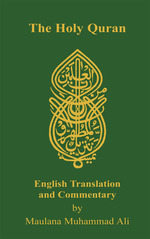
About the Author: Maulana Muhammad Ali
Born in 1874 in the Punjab (India) Maulana Muhammad Ali had a distinguished academic record, obtaining degrees in English and Law by 1899. As he stood on the threshold of a lucrative career in law, Hazrat Mirza Ghulam Ahmed, the reformer (mujaddid) of the 14th century Hijra, called on him to devote his life to the service of Islam. He forthwith abandoned his worldly plans and joined the great reformer in Qadian. Here he learned those gems of Islamic truth uncovered in this age by Hazrat Mirza Sahib through which Islam was now destined to attract people all over the world. He became the secretary of the organization and was appointed by Hazrat Mirza Sahib as the editor of the Review of Religions, one of the first Islamic journals in English. Under his editorship this journal presented the pristine beautiful face of Islam to a world which had seen only an ugly image of it.
When the successor of Hazarat Mirza Sahib, Maulana Nuruddin Sahib, died in 1914 certain elements in the organization led by the founder's son gained control of the movement, turning it into an exclusive intolerant sect ruled by a spiritual autocracy. They distorted and misrepresented Hazrat Mirza Sahib's views by asserting that he had claimed prophethood. These circumstances compelled Maulana Muhammad Ali to leave Qadian, and he along with his associates established the Ahmadiyya Anjuman Ishaat Islam in Lahore to continue Hazrat Mirza Sahib's real mission. From that date until his death in 1951 he led this society, organized its worldwide missionary activities, and produced a vast amount of invaluable scholarly literature in English and Urdu. His major works include: translations of the Holy Quran with detailed commentaries in both English and Urdu, The Religion of Islam, A Manual of Hadith, Fazl-i-Bari an exhaustive commentary on the Sahih Bukhari in Urdu, Muhammad the Prophet, The New World Order, the Early Caliphate, and the Living Thoughts of the Prophet Muhammad. This unique collection of books presents a picture of Islam restored to its original purity -- a religion of peace, tolerance, and spirituality. The Maulana's contribution to Islamic literature and revival of Islam has been highly acclaimed by eminent Muslims all over the world. A famous British Muslim scholar and translator of the Holy Quran, Marmaduke Pickthall, while reviewing the Maulana's monumental work the Religion of Islam, wrote in 1936 "Probably no living man has done longer or more valuable service for the cause of Islamic revival than Maulana Muhammad Ali of lahore..."

The Holy Qur'an EBook version
English Translation and Commentary
• Detailed commentary with extensive references to standard authorities, both classical and modern
• Comprehensive introduction deals with Islamic teachings and the collection and arrangement of the Holy Qur'an
• Extensive Index
Reviews
"There is no other translation or commentary of the Holy Qur'an in the English Language to compete with Maulvi Muhammad Ali's Masterpiece."
— Al-Haj Hafiz Ghulam Sarwar, translator of the Holy Qur'an
"To deny the excellence of Maulvi Muhammad Ali's translation, the influence for good it has exercised and its proselytizing utility would be to deny the existence of the light of the sun."
— Maulana Abdul Majid Daryabadi, leader of Orthodox Muslim opinion in India)
...has all the merits of what is desired in a translation."
— The Anjuman Himayat-e-Islam, Lahore, Pakistan
"...By far the best text currently available in the English language...incontestably one of the finest interpretations of the scared scripture of Islam. I have no hesitation whatsoever in recommending this translation to students and others seeking to understand the essence and epitome of the Quranic message."
— Prof. T. Hargery, Director, African Studies, Northeast Missouri State University, Kirksville
"...an austerely faithful translation in English...based on a close study of commentaries of the Qur' an -- the work of my learned name-sake Maulvi Muhammad Ali of Lahore...The translation and the notes...all demonstrate the labour of love and devoted zeal."
— Late Maulana Muhammad Ali Jauhar of "The Comrade"
"It is certainly a work of which any scholar might legitimately be proud."
— The Quest, London
 The Holy Qur'an EBook version
The Holy Qur'an EBook version